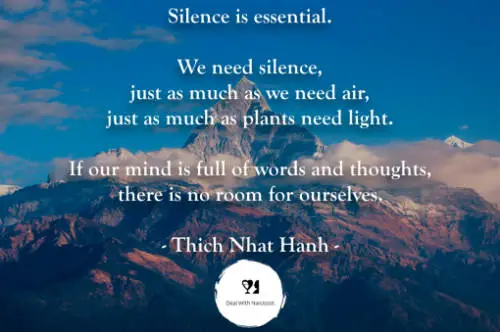In quite a few articles, I mention meditation as a good way to grow, develop yourself and protect your energy. I believe meditation can be very helpful when dealing with narcissists or having dealt with them. Meditation can be very challenging, but it’s definitely worth practicing. In this article, I will go into some tips in Buddhist meditation from Ajahn Brahm.
From experience, I know how draining it can be when interacting with narcissists. A narcissist can have a large impact on their environment by manipulating and abusing their victims. They try to create a web of control in which they can manipulate others and try to control others in order to get narcissistic supply.
Dealing with or having dealt with narcissists can have many consequences on you such as having increased self-doubts, having low self-worth, feeling anxious and/or confused. Their manipulative behaviour can be very brutal. Therefore, it’s very important and necessary to regain control and work on shifting the attention from the narcissist to yourself again.
Meditation can help with trusting your intuition and your own truth by eliminating ‘noise’ in your mind. It will help in getting clarity and observing reality in a less skewed way. I believe it can counteract the mind’s tendency to reduce the discomfort from cognitive dissonance when dealing with narcissists. The clarity resulting from meditation can help you to observe what’s really going on and the compassion used when meditating helps in acknowledging thoughts and (painful) feelings.
This article is closely related to my article about using conscious breathing in order to try to shift attention to yourself again when dealing with narcissists now or in the past. If you’re interested in mindfulness I recommend reading that article and my article exploring mindfulness and narcissistic abuse as well. It works well combined with practicing meditation.
I will shortly go into meditation and why I think it’s useful when dealing with narcissists. After that, I will share some tips. I hope this article might be helpful to you!
Meditation is letting go
Meditation is about letting go and practicing acceptance. You try to let go of the world around you in order to achieve a certain peace within yourself. You could see it as training your mind and gaining clarity.
Many people, including myself, are dominated by all kinds of thoughts. We can think about everything, then start thinking about the thinking itself, and then possibly think about it some more. It’s a form of chewing on your thoughts. Does this (over)thinking make any sense?
Meditation is to relax by standing still and to stop for a moment. This standing still can be very powerful and peaceful. You stop thinking, bring your mind back to your body and you are fully present in the here and now. Thich Nhat Hanh describes it as a dynamic and creative state of openness, for which you only have to be very awake and clear.
In my article about why not to outsmart a narcissist, I discuss how outsmarting could be seen as a lack of acceptance. Acceptance is important when it comes to narcissists, as they (ab)use your positive characteristics such as wanting to help, empathy and believing in the good of others. The painful experience with a narcissist can be hard to accept and by not accepting there remains a form of mental attachment to the narcissist.
When meditating you essentially practice acceptance of the truth of the here and now. Once any mind pattern or emotion occurs try to accept it and not judge it. If you practice acceptance for a while negative emotions will eventually be created less. You can become internally free of the situation. Being able to surrender yourself to the here and now and dropping inner resistance is spiritual power. Meditation or conscious breathing are methods that can really help in trying to accept the here and now.
Ego and narcissism
Narcissists are very involved in the world of the ego. Everything in the narcissist’s mind is about themselves and their need to receive ego-boosting, appreciation and/or validation.
I learned a lot from the Eastern philosophies Buddhism and Taoism about ego, nature, meditating and mindfulness. The wisdom of Eastern philosophies reveals the truth of the emptiness beneath the small world of a narcissist that only seems to involve appearance and their ego.
Meditation and mindfulness helped and still help me in dealing with my thoughts, emotions, stress, fears, and my energy. I am thankful for this and that’s why I like to share this experience as it might help others as well.
You can read more about ego in my article about self-worth, appreciation, ego, and narcissism. We can intuitively feel the energy of a narcissist is disturbed and it results in your energy being drained. Meditation will help to see more clearly and also to distinguish your own energy and the energy of others. It can thus be helpful in trying to protect your energy.
Meditation is hard work
Ajahn Brahm is very clear in his book: practicing meditation is hard work, especially in the beginning! Without (skilled) effort you will not make progress. The purpose of meditation according to Ajahn Brahm is to experience the beauty of silence, stillness, and clarity of mind.
A quote (translated from Dutch) from Ajahn Brahm about letting go:
‘The effort is focused on learning to let go, on developing a mind that relinquishes, to let go of the things that arise. The Buddha said that the most important factor to reach such a deep level of meditation is the ability to let go, to give up, to forsake.‘
Tips for meditating
I will now share some tips for practicing meditation that could be useful for both the beginner and the more advanced practitioners. Meditation is very personal so it’s great if you can find a method that suits you and feels comfortable. I recommend following a method because it offers a bit of structure in the practice, making it easier to persevere. Anyway, below are the tips!
Tip 1 – Enjoy being quiet
Silence is something beautiful! Try to enjoy being quiet and let the inner talk be. If you manage to be in silent awareness in the present moment, you will notice and realize how wonderful this experience is. If you don’t act, you stop thinking, your mind is brought back to your body, and you will become fully present in the here and now. This process requires time and practice, but it’s definitely worth it!
If you have experiences of silence it naturally becomes more attractive and important. When we realize that most of our thinking is not useful at all and actually gets us nowhere, we will want to spend more time in inner calmness!
Thich Nhat Hanh describes the importance of mindfulness and silence as follows:
‘Silence is essential.
We need silence,
just as much as we need air,
just as much as plants need light.
If our mind is full of words and thoughts,
there is no room for ourselves.‘
Silence cannot be taken for granted and it can still be very noisy in our heads even when it’s very quiet outside. How many minutes per day do you stay in complete silence?
If you feel too busy or overwhelmed by thoughts and feelings, you can try to listen to your breathing and meditate more often. It’s precisely when you feel that you are too busy that non-action or meditation is important and you should try to take the time to do so!
Tip 2 – There is no ‘bad’ meditation
The second tip is that there honestly is no such thing as ‘bad’ meditation. When starting out with meditation you might feel like it doesn’t work and you only get noisier in your head. You might feel like you’re doing something wrong. This isn’t true. You can appreciate your effort.
A good way to look at ‘bad’ meditation is the realization that meditation is hard work. The ‘bad’ moments are necessary effort. Just as you do not receive a salary every day, not every meditation is a ‘payday’. A ‘bad’ session is necessary and this effort is needed to develop the mind.
It might help to look at it as necessary hard work at those moments when you think a meditation session wasn’t good or wrong! It will be worth it.
Tip 3 – Be patient in building up meditation
Many people that start meditating try instantly doing breathing meditation with a ‘restless’ mind that jumps back and forth between past and future. There will still be a lot of inner talk or noise in the mind. Ajahn Brahm mentions the importance of correct preparation and going through different stages in meditation.
Lay the right foundation, where you start with working on concentration/focus and basic exercises for awareness of the here and now. In a later stage, you will practice breathing meditation. Patience is important because otherwise you can get frustrated quickly and you may give up meditation too quickly. To give it an honest attempt you need to go through different stages in meditation.
Allow yourself patience and trust the usefulness of small steps and developing your mind!
Tip 4 – It doesn’t matter where you perceive your breathing
When you focus on breathing, it means by definition that you focus on your breathing in the here and now. You experience, as it were, what the breathing does. It is not necessary to follow your breathing in specific places, such as on the tip of your nose or in the abdomen.
Ajahn Brahm says that this is actually ‘nose consciousness’ or ‘belly consciousness’ and therefore not at all focused on breathing. It can even distract from breathing as a whole. So don’t worry about where you perceive the experience, but focus on the experience of breathing itself.
Tip 5 – Do not try to control your breathing
Breathing meditation may cause a tendency to control breathing. This can make breathing itself uncomfortable because you give yourself directions. However, you just have to look at your breathing, but you don’t have to give yourself directions or think about it.
Try to enjoy the meditation and let the breath breathe. Observe it without judgment. If you can follow your breathing without interruption, you will feel more peace and joy! You can read more about practicing conscious breathing in this article.
Self-compassion
I hope these tips can be useful if you are practicing meditation or if you possibly want to start meditating. Some of these tips closely relate to self-compassion which I think is very important when dealing with narcissists. Being patient with yourself and knowing there is no bad meditation are forms of showing yourself compassion.
It can be very hard to show yourself compassion when dealing with a narcissist. Know you deserve your own compassion, kindness and caring attention.
I think it would be great to observe the tone you use when talking to yourself. You don’t have to agree with what your inner voice says or the tone that is being used. Is it judgmental or negative? It will help you if you can commit to being more positive or at least respectful when talking to yourself. It’s like setting a boundary in your mind because you’re worth being treated in a respectful way.
I believe the self-compassion and clarity resulting from practicing meditation will help you to better protect your energy. I hope this article can be helpful to you in some way and that you might learn to enjoy and appreciate the process of meditation!
I wish you strength and kindness.

If you like this article you might like these articles below as well!
– Exploring Buddhism and narcissism: What can we learn from a Buddhist perspective when experiencing narcissistic abuse?
– Exploring Taoism and narcissism: About not forcing, polarity, Yin and Yang, and being natural.
– Shifting attention to yourself again when dealing with narcissists using conscious breathing (mindfulness).
Did you like this article and is it helpful to you? I encourage you to share, like, follow, comment and possibly subscribe to my newsletter to receive monthly updates of my activities!

